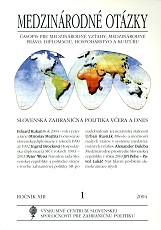Miesto a možnosti malých štátov v systéme medzinárodných vzťahov
The Place and Choices of Small States in the System of International Relations
Author(s): Urban RusnákSubject(s): Politics / Political Sciences
Published by: Research Center of the Slovak Foreign Policy Association (RC SFPA)
Summary/Abstract: The politics of small states in the system of international relations have an academic and practical dimension. On one hand, the international politics are under the dominance of big states, or more precisely of the superpower USA. On the other hand, the world faces many problems related to small and medium states. Small states originated differently. In Europe, most small countries rose from division of multinational states according to respective ethnic groups. In presence, there isn’t a precise definition of a small state. There are some traditional absolute criteria like the size, population, and gross domestic product of the country. Often relative criteria like the ability of selfdefense or the economic strength are used as well. Small states can be found everywhere. The actual size of the state doesn’t relate with its influence or significance. A state can be strong, successful and in some regions even influential.An example is Singapore. On the other hand, many small countries are in the stage of developing. The most widely used criteria for the sorting of states according to their size is population. At present, the common limit for the population of a small state is 5 million inhabitants. The process of globalization has a double effect on small states. The countries are more open in terms of economy because their potential for an autarchy economy is limited. However, the opening of economy includes a risk factor, which puts country’s development beyond direct control of the state. As a result, small states depend on larger countries and are interested to regulate mutual relations within the international law system. For same reasons, they welcome the creation of international organizations.
Journal: International Issues & Slovak Foreign Policy Affairs
- Issue Year: XIII/2004
- Issue No: 01
- Page Range: 91-101
- Page Count: 11
- Language: Slovak

